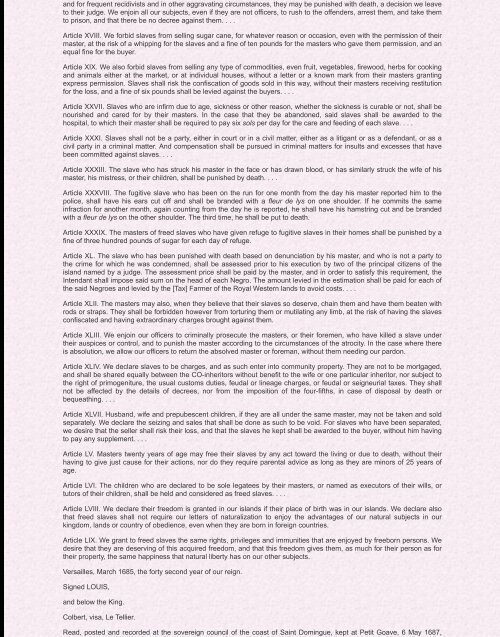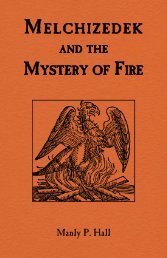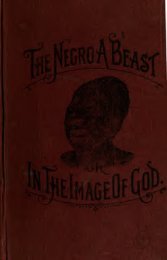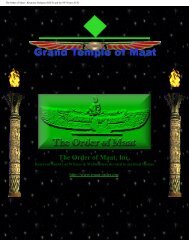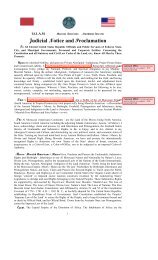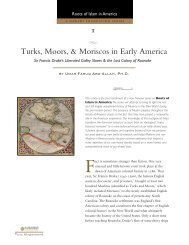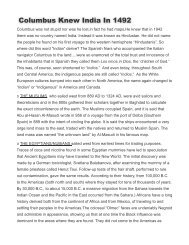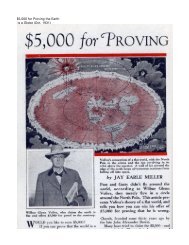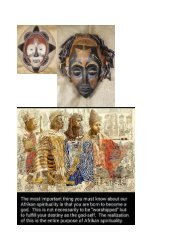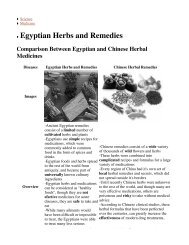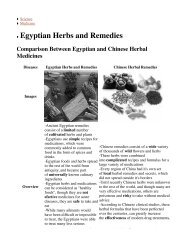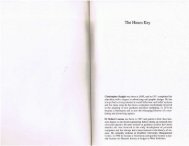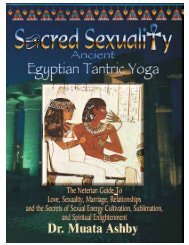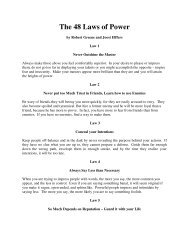Christian Slavery - Bad News About Christianity
Create successful ePaper yourself
Turn your PDF publications into a flip-book with our unique Google optimized e-Paper software.
and for frequent recidivists and in other aggravating circumstances, they may be punished with death, a decision we leave<br />
to their judge. We enjoin all our subjects, even if they are not officers, to rush to the offenders, arrest them, and take them<br />
to prison, and that there be no decree against them. . . .<br />
Read, posted and recorded at the sovereign council of the coast of Saint Domingue, kept at Petit Goave, 6 May 1687,<br />
Article XVIII. We forbid slaves from selling sugar cane, for whatever reason or occasion, even with the permission of their<br />
master, at the risk of a whipping for the slaves and a fine of ten pounds for the masters who gave them permission, and an<br />
equal fine for the buyer.<br />
Article XIX. We also forbid slaves from selling any type of commodities, even fruit, vegetables, firewood, herbs for cooking<br />
and animals either at the market, or at individual houses, without a letter or a known mark from their masters granting<br />
express permission. Slaves shall risk the confiscation of goods sold in this way, without their masters receiving restitution<br />
for the loss, and a fine of six pounds shall be levied against the buyers. . . .<br />
Article XXVII. Slaves who are infirm due to age, sickness or other reason, whether the sickness is curable or not, shall be<br />
nourished and cared for by their masters. In the case that they be abandoned, said slaves shall be awarded to the<br />
hospital, to which their master shall be required to pay six sols per day for the care and feeding of each slave. . . .<br />
Article XXXI. Slaves shall not be a party, either in court or in a civil matter, either as a litigant or as a defendant, or as a<br />
civil party in a criminal matter. And compensation shall be pursued in criminal matters for insults and excesses that have<br />
been committed against slaves. . . .<br />
Article XXXIII. The slave who has struck his master in the face or has drawn blood, or has similarly struck the wife of his<br />
master, his mistress, or their children, shall be punished by death. . . .<br />
Article XXXVIII. The fugitive slave who has been on the run for one month from the day his master reported him to the<br />
police, shall have his ears cut off and shall be branded with a fleur de lys on one shoulder. If he commits the same<br />
infraction for another month, again counting from the day he is reported, he shall have his hamstring cut and be branded<br />
with a fleur de lys on the other shoulder. The third time, he shall be put to death.<br />
Article XXXIX. The masters of freed slaves who have given refuge to fugitive slaves in their homes shall be punished by a<br />
fine of three hundred pounds of sugar for each day of refuge.<br />
Article XL. The slave who has been punished with death based on denunciation by his master, and who is not a party to<br />
the crime for which he was condemned, shall be assessed prior to his execution by two of the principal citizens of the<br />
island named by a judge. The assessment price shall be paid by the master, and in order to satisfy this requirement, the<br />
Intendant shall impose said sum on the head of each Negro. The amount levied in the estimation shall be paid for each of<br />
the said Negroes and levied by the [Tax] Farmer of the Royal Western lands to avoid costs. . . .<br />
Article XLII. The masters may also, when they believe that their slaves so deserve, chain them and have them beaten with<br />
rods or straps. They shall be forbidden however from torturing them or mutilating any limb, at the risk of having the slaves<br />
confiscated and having extraordinary charges brought against them.<br />
Article XLIII. We enjoin our officers to criminally prosecute the masters, or their foremen, who have killed a slave under<br />
their auspices or control, and to punish the master according to the circumstances of the atrocity. In the case where there<br />
is absolution, we allow our officers to return the absolved master or foreman, without them needing our pardon.<br />
Article XLIV. We declare slaves to be charges, and as such enter into community property. They are not to be mortgaged,<br />
and shall be shared equally between the CO-inheritors without benefit to the wife or one particular inheritor, nor subject to<br />
the right of primogeniture, the usual customs duties, feudal or lineage charges, or feudal or seigneurial taxes. They shall<br />
not be affected by the details of decrees, nor from the imposition of the four-fifths, in case of disposal by death or<br />
bequeathing. . . .<br />
Article XLVII. Husband, wife and prepubescent children, if they are all under the same master, may not be taken and sold<br />
separately. We declare the seizing and sales that shall be done as such to be void. For slaves who have been separated,<br />
we desire that the seller shall risk their loss, and that the slaves he kept shall be awarded to the buyer, without him having<br />
to pay any supplement. . . .<br />
Article LV. Masters twenty years of age may free their slaves by any act toward the living or due to death, without their<br />
having to give just cause for their actions, nor do they require parental advice as long as they are minors of 25 years of<br />
age.<br />
Article LVI. The children who are declared to be sole legatees by their masters, or named as executors of their wills, or<br />
tutors of their children, shall be held and considered as freed slaves. . . .<br />
Article LVIII. We declare their freedom is granted in our islands if their place of birth was in our islands. We declare also<br />
that freed slaves shall not require our letters of naturalization to enjoy the advantages of our natural subjects in our<br />
kingdom, lands or country of obedience, even when they are born in foreign countries.<br />
Article LIX. We grant to freed slaves the same rights, privileges and immunities that are enjoyed by freeborn persons. We<br />
desire that they are deserving of this acquired freedom, and that this freedom gives them, as much for their person as for<br />
their property, the same happiness that natural liberty has on our other subjects.<br />
Versailles, March 1685, the forty second year of our reign.<br />
Signed LOUIS,<br />
and below the King.<br />
Colbert, visa, Le Tellier.


